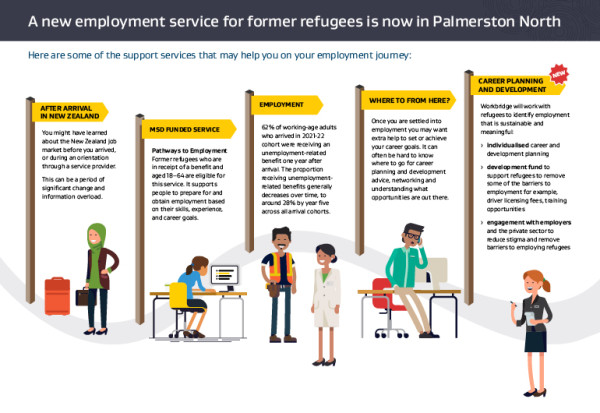Refugee employment pilot
In 2023 we began a refugee employment pilot project. This pilot is now closed to new enrolments and ends in December 2025.
Outcomes and findings of the refugee employment pilot
In October 2023 we announced our refugee employment pilot in Palmerston North to support refugees to access employment and development opportunities relevant to their skills and goals. It was a way to engage with the private sector to reduce barriers to refugee employment.
Workbridge — Te Arawhiti mō Mahi, a nation-wide provider of employment services, implemented the pilot, which is now closed to new enrolments and is focused on supporting current clients.
Workbridge — Te Arawhiti mō Mahi website
Pilot outcomes
- Over 120 former refugees from 12 countries joined the pilot.
- Each person received a career plan, training support, and pastoral care.
- 63 participants have already found jobs that match their skills and goals.
- Another 15 are expected to be employed before the programme ends in December.
- The pilot helped fill a gap for refugees wanting career-focused employment.
- Many had worked before but couldn’t move into roles matching their qualifications.
- Most participants (91%) were Quota Refugees.
- Others came through Refugee Family Support (4%), Afghan Response (4%), or CORS (1%).
The findings will be used to inform the cross-agency work MBIE is leading to review the services provided as part of the New Zealand Refugee Resettlement Strategy.
Other findings
Barriers for former refugee clients
- Limited knowledge of local industries and job opportunities.
- Unfamiliar with how to search, apply, and interview for skilled roles.
- Few connections with employers and businesses.
- Not aware of or unable to access Government-funded training to build skills.
Barriers for employers
- Misunderstandings about the skills and residency status of former refugees.
- Challenges assessing workplace skills and health and safety awareness.
Refugee employment pilot infographic
- individualised career and development planning,
- a development fund to support refugees to remove some of the barriers to employment (for example driver licensing fees, training opportunities), and
- engagement with employers and the private sector to reduce stigma and remove barriers to employing refugees.
A new employment service for former refugees is now in Palmerston North
Here are some of the support services that may help you on your employment journey:
After arrival in New Zealand
You might have learned about the New Zealand job market before you arrived, or during an orientation through a service provider.
This can be a period of significant change and information overload.
MSD-funded employment
Pathways 2 Employment
Refugees who receive a benefit are eligible for the MSD-funded employment service which helps working age refugees prepare for employment, and matches job seekers with conversational English classes for a maximum of 6 months.
The first job
61% of working age refugees who arrived in 2018/2019 were receiving an unemployment-related benefit 1 year after arrival.
This number steadily decreased over time, to around 25% by year 5.
Where to from here
Once you are in employment, it can be hard to know where to go for career planning and development advice, networking, or to understand what opportunities are out there.
This can lead to feeling trapped in employment situations, and not knowing how to find alternative work that is secure, and meaningful.
Career planning and development
Workbridge will work with refugees to identify employment that is sustainable and meaningful, including:
